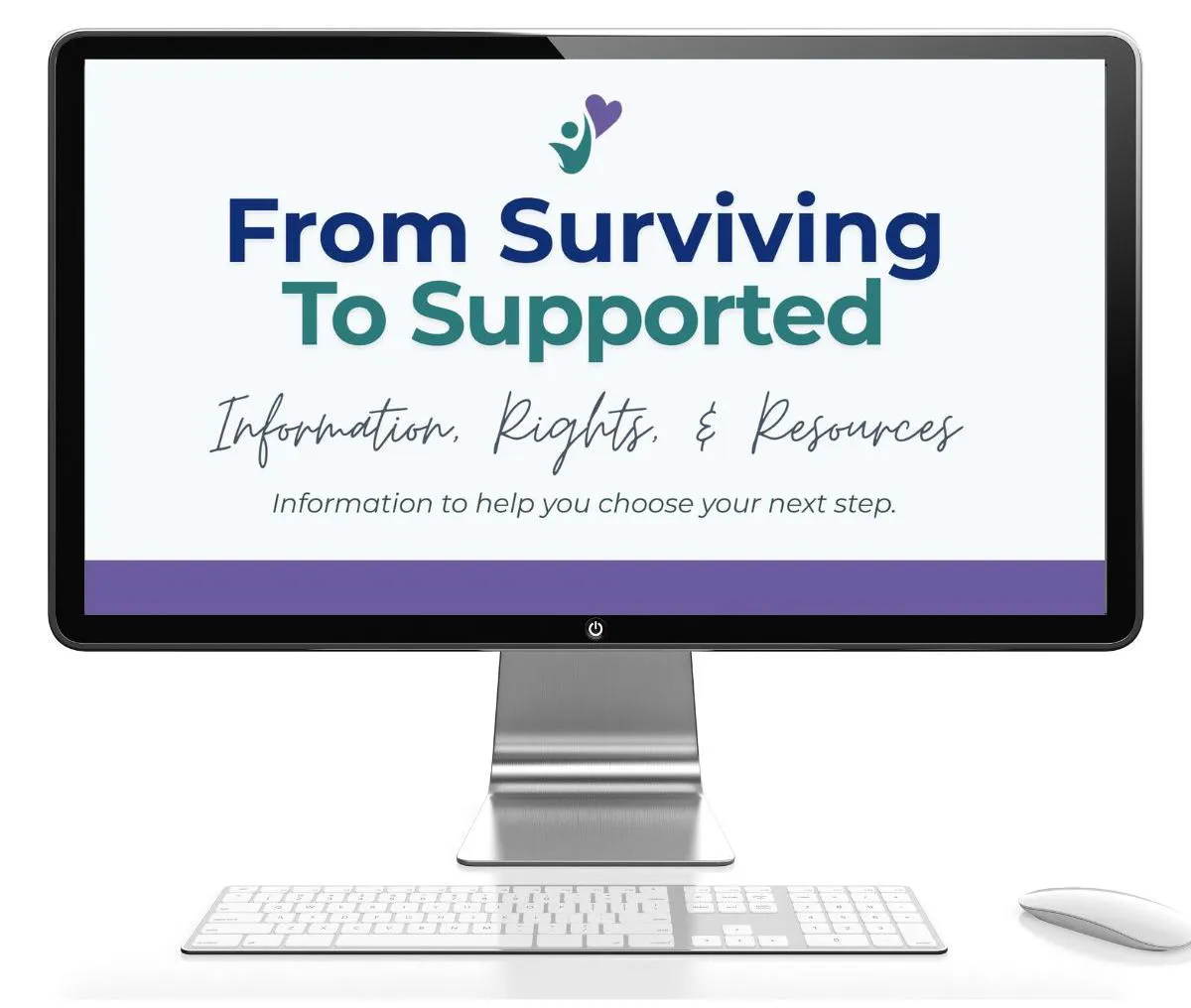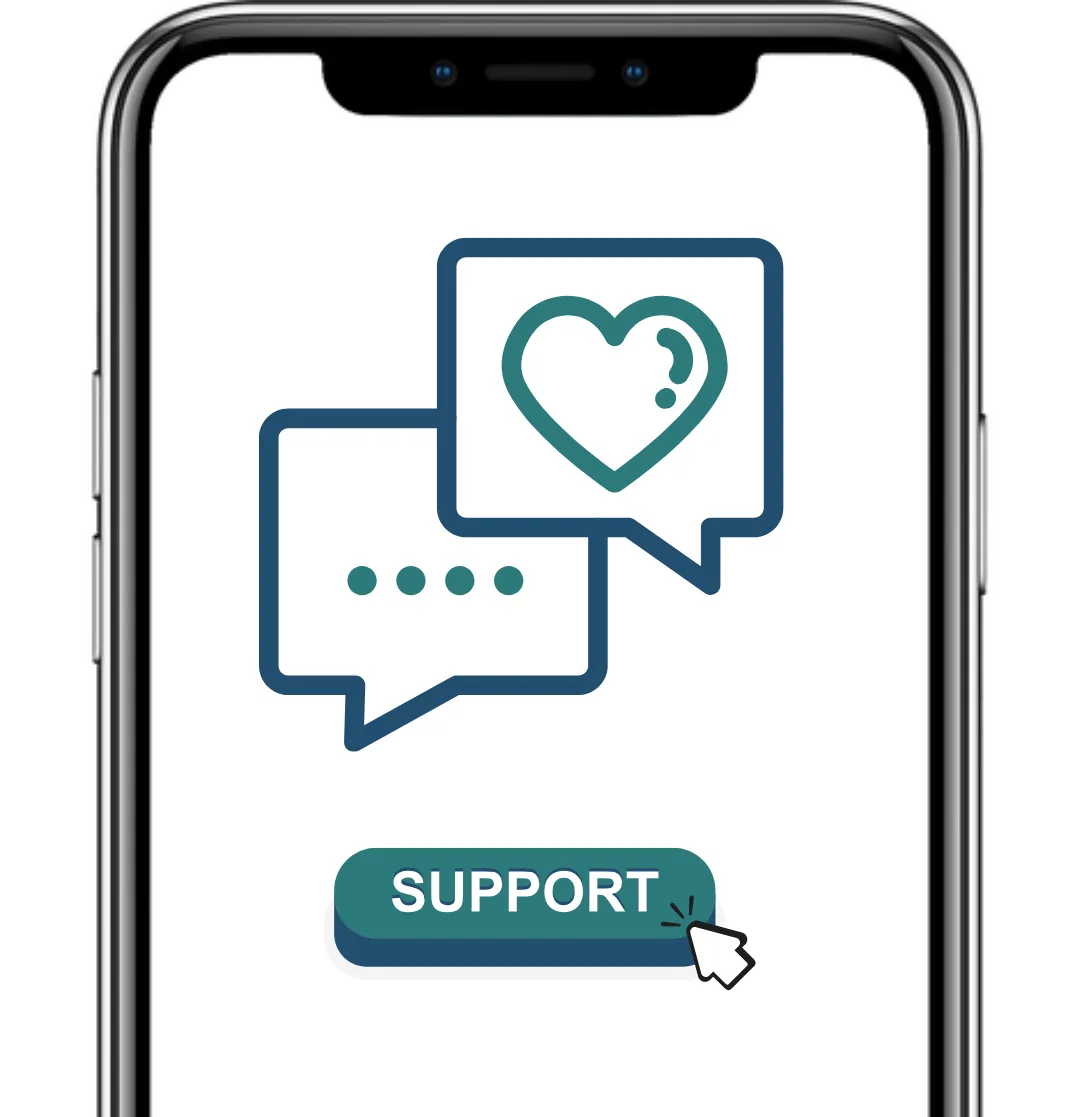A Clear, Confidential Path Forward — at Your Pace.
Calm guidance and real support for survivors and anyone seeking help after harm—without pressure or judgment.
Confidential • No Cost • 24/7
You’re safe here. We use plain, non-graphic language.
You choose what happens next—reading is enough.
Why this
Can Feel Overwhelming
Finding real help online can be confusing, noisy, or sales-driven.
Many resources aren’t written in plain language or from a survivor’s perspective.
When information is unclear, it’s easy to delay care or miss options that protect your well-being.
None of this is your fault. You deserve clear choices, privacy, and support that honors your pace.

choice-centered, 3 steps
How it Works
Every survivor’s path looks different. These steps give you the information, privacy, and support you need to make decisions that feel right for you — not rushed, not judged, and never out of your control.
Step 1: Get Oriented
Browse our survivor-centered Articles for calm explanations of care, counseling, reporting, and justice options..
Step 2: Choose Support
Pick what helps today: self-guided resources, a confidential chat, or local referrals. Anonymous options available.
Step 3: Act on Your Terms
If and when you’re ready, see accountability and justice pathways. We explain each step first. You can pause or stop at any time.

Why Survivor Advocate Helps
Safety & Stability: Calm guides, crisis tools, and vetted resources that reduce overwhelm.
Strength & Confidence: Peer-informed content and advocate support to help you reclaim your story.
Choice & Justice: If you wish, we connect you to accountability and justice—always consent-based, never rushed.

From Victim to Empowered Survivor — Empowerment begins when you control the story. With clear guidance and a supportive community, you can choose what comes next—moving from reacting to trauma to actively shaping your future.
LIVE WEBINAR
You Deserve Answers — and a Path Forward.
Watch Our Survivor Webinar to Learn Your Options in a Safe, Compassionate Space — Created to Help You Understand Your Options, at Your Own Pace
This isn’t a typical webinar — it’s a confidential and private space designed to help survivors find clarity after trauma. In this short video, you’ll hear from people who understand what it feels like to carry unanswered questions, fear, and doubt.
You’ll learn — safely and simply — what your options are, how support works, and what next steps you can take if you choose. There’s no pressure, no judgment, and no obligation — just understanding, truth, and real information for people who have already been through too much.
You’re not alone, and you deserve to know the choices that belong to you.

(Your Identity is Confidential)

Your Privacy & Control
Share only what you want
Pause anytime
We never share without your consent
Before any next step, we explain what it involves—no surprises

Safety Tools
Quick Exit: Leave this page instantly.
Private Browsing Tips: Clear history, use an incognito window, device safety.
Accessibility: Readable fonts, contrast-safe design, keyboard/focus support.
Language options: Español disponible; interpreter support upon request.
You decide what happens next.
Find your way forward with calm guidance, real support, and an optional path to justice—on your terms.
Understand timelines, documentation tips, and your rights alongside healing resources—explained simply and available whenever you’re ready.
No pressure. No timeline. You decide what happens next.

Frequently Asked
Questions
If you’re unsure where to begin, these FAQs offer calm guidance and simple next steps.
What if I’m in immediate danger?
If you or someone else is in danger, call your local emergency number right now. If you’re not safe to call, consider a trusted crisis hotline or a nearby safe place. Your safety comes first.
Do I have to report to police to get help?
No. Support, medical care, therapy, and many legal options may be available whether or not you report. Reporting is your choice and can be made later in many situations.
Can I get medical care without making a police report?
Often yes. In many areas you can receive a medical exam and evidence collection (sometimes called a “rape kit”) without filing an immediate police report. Ask about anonymous or “Jane/John Doe” options where available.
How soon should I seek medical attention?
As soon as you’re able. You can be treated for injuries, STIs, or pregnancy prevention. Evidence collection has time limits that vary by location; sooner is usually better, but care is still valuable even if time has passed.
What are my legal options?
Options may include protective orders, criminal reporting, civil claims for damages, campus Title IX processes, workplace complaints, or church/organizational reporting. Which paths fit depends on your state, timing, and goals. An attorney or advocate can explain timelines and next steps.
What if I’m worried about my immigration status?
Help may still be available. Some survivors may qualify for protections (e.g., certain visas) or confidential reporting channels. Speak with a trauma-informed immigration or victims’ rights attorney before sharing details publicly.
How can I protect my privacy and digital safety?
Use a safe device, private browsing, and strong passcodes. Consider turning off shared location, changing important passwords, and avoiding shared cloud accounts. If tech safety is a concern, use a trusted device outside your home.
How much does it cost to talk to an attorney?
Initial consultations in this area are often free. Many civil attorneys work on contingency (they’re paid only if you recover money). You should receive a clear explanation of fees before you agree to anything.
I’m not sure what happened. Can I still seek help?
Yes. Confusion, memory gaps, or mixed feelings are common after trauma. You deserve support whether you’re certain or not. A counselor or advocate can help you process and consider next steps—no pressure.
How do I support a friend or family member who disclosed to me?
Listen, believe them, and avoid pressing for details. Ask how you can help, offer options (medical care, advocacy, legal info), and respect their choices. Check in again later; consistency builds trust.
Is clergy or institutional abuse different?
It can involve spiritual betrayal, power dynamics, and institutional responses. You can seek both survivor-centered care and accountability (internal reports, civil/criminal paths). Independent advice helps separate faith from institutions and focus on your safety.
What if the assault happened a long time ago?
You can still seek support. Civil and criminal time limits (statutes of limitation) vary by state and situation; some have extended “reviver” windows. An attorney can quickly assess timelines and options.
Can I stay anonymous?
Hotlines and many advocacy services allow anonymous contact. Legal processes have different rules; an attorney can explain where your name might appear and how to maximize privacy.
How do I find a trauma-informed therapist?
Look for clinicians trained in EMDR, CBT, or somatic therapies with experience in sexual trauma. Ask about their approach, confidentiality, and first-visit goals. It’s okay to try a few to find a good fit.
What happens if I fill out your attorney-match form?
We’ll review your safe contact preferences, match you with an experienced, survivor-sensitive attorney in your state, and offer a free, no-obligation consult. You decide if and when to move forward.

We help survivors take the next step — informed, supported, and never alone. Our platform connects you with accurate information, healing resources, and guidance to help you understand your legal rights and take action when you’re ready.
Quick Links
© 2025 Survivor Advocate - All Rights Reserved.
Contact
FAQ
Privacy Policy
Disclaimer: By submitting any form on our website, you consent to receive phone calls, text messages, emails, and other communications regarding free claim evaluations. We value your privacy and handle your data in accordance with the Terms of Use and Privacy Policy. Message and data rates may apply, and your consent to receive communications is a condition of receiving a free evaluation. You may opt-out of communications at any time by following the instructions provided in the Terms of Use and Privacy Policy. We are not a law firm and do not provide legal advice. We pre-evaluate your situation based on the information provided by you. If we believe that your situation may benefit from legal advice, only upon your additional consent and approval, will we refer your application to a law firm for possible assistance. If you decide to entertain legal assistance, that arrangement will be subject to the terms of a separate agreement between you and the law firm which you are seeking legal counsel. Any referrals are not binding unless accepted by the law firm which you are seeking legal counsel. We are not responsible for the actions, advice, or outcomes of any referred law firm. Users should independently evaluate any legal advice or representation they receive. This communication is not legal advice and therefore cannot guarantee or predict the outcome of any legal matter. By using this website and any of its functionalities, you confirm that you have read and agree to the Terms of Use and Privacy Policy.
If you have any questions regarding this disclaimer or your rights, please contact us using the email address provided in the Terms of Use and Privacy Policy.

Facebook
Instagram
X
LinkedIn
Pinterest